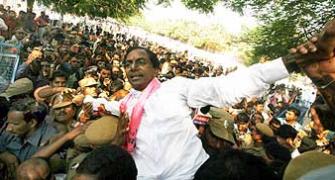Once India's teeming numbers was thought to be a problem; today, its youth power has stood the problem on its head. Thanks to this, as 2009 passes into history, India for one is ready to ring out the old and bring in the new, writes Saisuresh Sivaswamy.
Today's India is vastly different from the one most of us grew up in. There is a new India that is rising, a young India that is yearning to join the international ranks of the brightest and best. And you can see this young India making its mark in every field, including those that were considered 'un-Indian' a couple of decades ago.

Who could have predicted, five years ago, that the Holy Grail of international cinema, namely the Oscar, would be won by Indians?!
Who could have guessed that India, long considered to lack the killer instinct on the field, would be crowned kings of Test cricket?!
There is a new India around us, younger than the one we have known, accompanied by youth's impetuosity and confidence, and unshackled by the baggage of the past. This is not merely a result of the statistical quirk that the bulk of India's population is under 40. Rather, it is a change in outlook where the diffident 'maybe' has been replaced by the assertive 'can-do.'
Would it be right to place the source for this transformation in the mindset of a billion people at the feet of an old, written-off prime minister? P V Narasimha Rao may have had an International Monetary Fund gun at his head in 1991 that prompted him to kiss goodbye to India's controlled economy; his own Congress party may treat his legacy as a pariah's, but there can be no disputing that Rao changed India forever. For the better, I daresay.
This is a generation that has grown up on the benefits of the change he brought about, a generation which doesn't have to wait in lines for phone and cooking gas connections, which is clued in to international trends as they happen and which, finally, is not bashful of flaunting what it's got.
Once upon a time Indians only aspired; today they know they can realise their dreams. So it is but natural that as the Gen Next rises to the top everywhere, politics too should embrace change.
Look around, and you will find that political parties, quick to realise the power of youth and the strength in their numbers, are moving to accommodate them. The Indian youth's distaste for politics is well known, so how do you bring them onboard? Simple: by making them stakeholders in the process. Not by being on Facebook, blogging, or using the mobile, as senior Bharatiya Janata party leader L K Advani and his advisors thought in early 2009, but by co-opting them in the decision-making process.
So, the story of 2009 is that political parties across the map are shifting gears, preparing for the handover. And it's not just the grand old party of India; you have the regional Dravida Munnetra Kazhagam in the south, the Nationalist Congress Party in the west, the Samajwadi Party and the National Conference in the north all accommodating the next generation.
To a large extent, the BJP's troubles across India and the Marxists' woes in the east stem from their inability to come to terms with this dramatic change. It cannot be easy in a society, which has traditionally respected and revered the old, but unless political parties make this adjustment the road ahead is bound to be bumpy.
Surprisingly, the Congress has beaten others in the game, helped by the fact that it had the weaponry ready to deploy. Barely two years ago, Rahul Gandhi was an object of scorn as he went about the task of reviving the political party his family has come to be identified with. And when Mayawati won the 2007 Uttar Pradesh assembly election in which the Congress was decimated, Rahul was seen as a no-hoper.
But in just two years, the criticism has been replaced by paeans. Is it merely the 'Dynasty factor' that has been responsible for this change in perception? Or could it be his re-engineering of the party to bring in more youngsters through democratising the Youth Congress?
Rahul Gandhi, it seems, has seen what has escaped the battle-scarred veterans: That unless the young of India are brought back to politics, it will always be out of step with the rest of the nation.
Ask a youngster what he thinks of politics and the answer will be spat out: 'Sab saale chhor hain (heck, everyone's a thief)'.
Perceptions change only through involvement and engagement, and this is what Rahul Gandhi has been trying to do with the youth. It's not a secret formula really. A sign that he has been successful is that other political parties too are putting in place their own succession plans.
In Rahul Gandhi's case it helps, of course, that his mother is party president, and the prime minister is indulgent towards the political heir. But there have been similar instances in the past, specifically involving the Congress party; when they had the chance, neither Rahul Gandhi's father nor his uncle Sanjay Gandhi showed any such inclination to change the ground rules.
They took their inheritance for granted, and the outcome is well-known. In contrast, Rahul Gandhi has been going about it as the circumstances of the day warrants.
He may be a young man in a hurry, but he has carefully maintained a distance between himself and power. At the Congress Parliamentary Party meeting held after the 2009 Lok Sabha election, for instance, he deflected attention from himself and kept to the background.
He may be the heir in waiting, but he isn't going about disrupting the perfect political arrangement that his mother has put in place. Dr Manmohan Singh as prime minister and Sonia Gandhi as Congress president has worked well, so why fix it when it ain't broke?
Naturally, Rahul Gandhi's concerns are different from the old guard's, which he demonstrated tellingly during the recent Lok Sabha debate on the Liberhan Commission report dealing with the Babri Masjid's demolition. As the veterans scored points on national television over an issue that has long left India bored, Rahul Gandhi was elsewhere, engaging the youth and discussing their dreams for tomorrow.
We could all have our heads buried in the past, but the young have no time to dwell in yesterday. Their concerns are not what happened in 1947 or 1992, but what will happen tomorrow. That does not mean they lack a historical perspective, but that the past is a mere reference point in their journey, not the destination.
Once India's teeming numbers was thought to be a problem; today, its youth power has stood the problem on its head. Thanks to this, as 2009 passes into history, India for one is ready to ring out the old and bring in the new.
Saisuresh Sivaswamy is Editorial Director, rediff.com








